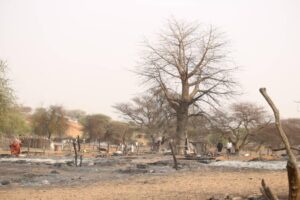Darfur Victims Support Organization On the Devastating Fire in Tawisha Locality – North Darfur
The Darfur Victims Support Organization expresses its deep concern and sorrow over the tragic fire incident that broke out on the morning of Friday, May 2, 2025, in one of the villages of Tawisha locality, North Darfur. The fire led to the complete destruction of 68 homes and partial damage to 16 others, leaving dozens of families homeless under extremely dire humanitarian conditions. These families lost the few belongings they relied on to endure the harsh realities of daily life.
According to field sources and testimonies from local residents, the fire was exacerbated by strong winds, coupled with the absence of firefighting systems and the widespread use of highly flammable local materials such as straw and wood in housing construction. This structural fragility reflects the broader vulnerability of infrastructure in many rural areas across Sudan, where the lack of basic safety and prevention measures makes communities highly susceptible to such disasters.
The Darfur Victims Support Organization stands in full solidarity with all those affected by this disaster and calls on local and state authorities, as well as national and international humanitarian organizations, to urgently intervene with immediate assistance, including the provision of tents, temporary shelters, food, clean water, medical supplies, and psychosocial support for the displaced families.

In this context, the organization stresses that an effective response requires close coordination with local community committees to ensure aid is delivered fairly, transparently, and efficiently, while also enhancing the capacity of communities to recover and rebuild.
Furthermore, the organization underscores the importance of proactive planning and disaster risk reduction to prevent the recurrence of such tragedies, by:
• Implementing community awareness and fire prevention training programs.
• Improving housing designs through the use of safer and more resilient materials.
• Supporting the establishment of trained first-response teams capable of handling emergencies in rural communities.
• Integrating risk reduction strategies into local development planning frameworks.
This tragic incident serves as a painful reminder of the fragile humanitarian situation in Darfur and the urgent need for swift, coordinated action to prevent further loss of life and property, while fostering resilience in affected communities.

